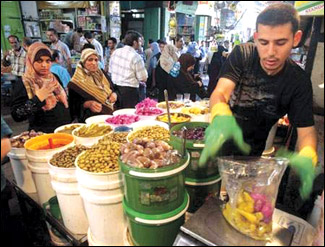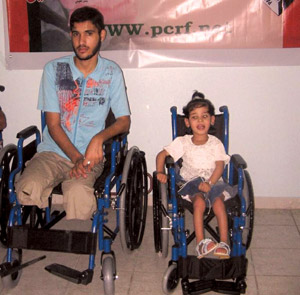|
Mass poverty:
Nine out of ten Gazans live in poverty
As the continuing Israeli siege strangles the economy
:
Mohammed Omer
According to a September 2009 report from the United Nations
Conference on Trade and Development (UNCTAD), living conditions and
access to sources of livelihood in Gaza are currently at their worst
since 1967, with poverty affecting 90 percent of the population. The
World Bank says that Palestinians currently are experiencing the worst
economic depression in modern history.
|

A Palestinian vendor sells pickles in a market in Gaza City |
Israel’s excuse for its continuing siege on the citizens of Gaza -
which it instituted following the January 2006 free and fair elections
in which Palestinians in Gaza and the West Bank elected a Hamas
government - is that the small strip of land is a hostile entity and den
of terrorism, and that the continued starving and impoverishment of its
people is necessary for Israel’s security. Like most military actions,
however, the siege of Gaza has little to do with religion or terrorism.
Rather, it is primarily economic and political.
Natural resources
Off the coast of Gaza exists a large underground natural gas field -
Israel’s prize if Gaza is broken, for Tel Aviv covets the land and
natural resources of Gaza, not the human beings who live there. The West
Bank also possesses a natural gas reserve. According to more than one
country’s intelligence sources, Israel began parallel drilling and
siphoning off the West Bank natural gas through Jerusalem in the late
1990s. Under the Geneva Conventions, this is a war crime.
Prior to the 2006 elections, the Fatah-led Palestinian Authority
controlled Gaza. That government - its corruption a major factor in its
ouster from power - negotiated a deal whereby Israel would be allowed to
withdraw the gas from the Gaza fields, keeping the bulk of the profits.
The marked-up gas would then be sold back to its rightful owners in Gaza
for their use (a practice Israel employs with regard to other basic
necessities such as electricity, fuel and water).
|

Palestinians in Gaza engaged in their livelihood |
The election of Hamas, however, caused the natural gas deal to fall
apart, since Hamas contended that the resources of Gaza should benefit
Gazans rather than Israelis. Realizing that bribes and theft would not
work with the new Palestinian government, Israel decided to isolate and
attempt to overthrow it, and imposed its draconian siege on Gaza and its
1.7 million residents - despite the fact that collective punishment also
is a war crime under the Geneva Conventions.
Israel’s strategy is transparent: to methodically make life in Gaza
impossible by destroying its economy, and thus each family’s ability to
survive. Starved and desperate, the theory goes, the people of Gaza will
rise up against and overthrow Hamas, thus enabling Israel to assist in
reinstating a government it can control. After three and a half years,
however, that has yet to occur.
Israel’s December-January military assault on Gaza caused an
estimated $4 billion in damage - three times the value of the strip’s
entire gross national product (GNP). Despite international pledges at
the Sharm el-Sheikh donors’ conference this past March of over $4.5
billion in aid-much of which remains an unfulfilled promise - Gaza’s
destroyed economy has not improved. The water, sewage and electricity
infrastructure, already severely debilitated by the siege, is now
stretched to breaking point.
Prior to Israel’s 1967 occupation of Gaza, the small region was
essentially self-sufficient, thanks to its textiles, arts and
agricultural products. Now, however, as a result of the siege, Gaza’s
farmers have been unable to export most of their crops for the third
year in a row, forcing thousands out of work and tens of thousands below
the poverty line.
An example
|

Gazans continue to survive and pray for the day when they
may lead
normal lives. Courtesy google.com |
Mohammed Al Telbani’s Al Awda Biscuits Factory in the Gaza Strip is
an example that can be multiplied by the thousands. Al Telbani’s factory
was a successful business with 400 employees, producing 40 types of
chocolates, biscuits and ice-cream. “I never thought the day would come
when my 400 workers would be laid off,” he lamented. “It’s something
that never entered my mind.”Businesses anywhere in the world need raw
materials, human capital and cash flow in order to survive. Of late,
Israel allows three types of raw materials into Gaza: “sugar, flour and
butter,” enumerated Al Telbani. Among the more than 100 prohibited
materials he requires that Israel prohibits from entering Gaza are
cartons, paper, plastic covers, chocolate, hygienic materials, and spare
parts for machines.
Even if Al Telbani could find the necessary items, however, he would
be unable to purchase them, because his finances are controlled by The
Bank of Israel - which in January officially cut its ties with all banks
in Gaza.
Gaza’s Banking Crisis
Americans who have lost their homes and jobs as a result of the
current financial and mortgage meltdown are only too familiar with the
economic calamity bankers and financial institutions can cause. Imagine
if the banks and corporations inflicting the damage were not even U.S.
institutions! Welcome to Gaza, where Israel, rather than Palestinians,
controls the banking system. Israeli financial institutions have imposed
a series of hidden controls that paralyze cash flow and prevent commerce
and employment from functioning effectively.
Even local banks have restricted loans to Gazans because of the risk
of nonpayment. “The siege has affected banks’ ability to offer standard
facilities to people,” said Thaer Hamaied, head of public relations and
marketing at the Bank of Palestine Ltd. “In the West Bank our bank has
not been affected as much as Gaza,” he added. “The investment rate in
the Gazan bank is much slower than in our branches in West Bank, where
there is noticeable improvement.”
Monetary transfers
For several months, Israel’s largest bank, Hapoalim, and others,
backed by the Israeli central bank, have refused to handle monetary
transfers to Gaza, including benefits to disabled workers who have been
injured during work-related incidents in Israel (see July 2009
Washington Report). Furthermore, Israel is responsible for reprinting
paper money that has become worn out. According to a Gaza bank official,
however, “Israel hasn’t been doing this lately, thereby causing a money
shortage.” U.N. agencies have made a deal to allow U.S. dollars into the
Strip, he added, but only to pay wages to U.N. staff.
The World Bank has warned that “the liquidity crisis could lead to
the collapse of the commercial banking system in Gaza.” In the eyes of
Gaza economists, the pauperization of Gaza’s economy is not accidental
but deliberate.
According to some experts, the economic disaster in Gaza has been a
long time coming. A key element of the Oslo agreement between Israel and
the PLO was the 1994 Paris Economic Protocol, resulting in Gaza and the
West Bank becoming economically dependent on Israel. All Palestinian
imports and exports had to pass through Israeli sea- and airports and
border crossings.
Moreover, Israel was given responsibility for collecting and
transferring taxes on trade to the new Palestinian Authority, thereby
making it the “gatekeeper” of Gaza’s and the West Bank’s economy. As
part of its attempt to crush Hamas in recent years, Israel has refused
to remit to the Palestinian Authority the taxes collected on its behalf.
The basis for some of Israel’s actions appears to be a Sept. 19, 2007
cabinet decision declaring Gaza a “hostile territory.” The Olmert
government decided to restrict “the passage of people to and from Gaza”
and to further reduce supplies of fuel and electricity. The resulting
border closure caused Gaza to lose many potentially lucrative trade
contracts, shutting down as it did nearly all avenues of trade.
In 2008, the Palestinian economy lost ground for the ninth year in a
row, the UNCTAD report found. The 2% economic growth for that year,
which included substantial donor support of US$1.9 billion, represented
a one-third drop in per capita gross domestic product (GDP) since 1999,
despite extensive reforms implemented by the Palestinian Authority.
The economic decline is rooted in Israel’s closure policy, the
erosion of the Palestinian productive base, the loss of some of the West
Bank’s most fertile land and natural resources to the Israeli separation
wall, and expanding settlement activities, the report contends.
“The net result of four decades of occupation,” it concluded, “is
expanded Israeli settlements and controls, combined with diminishing
Palestinian economic policy space, reduced physical territory, and
reduced access to natural and economic resources.”
The Gaza Ghetto
As were the Jews of Warsaw during World War II, 21st century Gazans
find themselves surrounded by walls and an occupying military, and
dependent upon tunnels for trade and the most basic of life’s
necessities, from fuel to toilet paper. What little money people have
exits Gaza through the tunnels into Egypt, where these staples are
purchased and smuggled back. No money returns to Gaza - there is nothing
for Egyptians or anyone abroad to buy - creating a trade deficit of 100
percent.
Challenge
“Sixty percent of our business used to be exports to the West Bank
and Jordan,” said Al Telbani. Today 100 of his 400 former employees are
lucky if they can work 12 days a month and supplies manage to make it to
Gaza through the tunnels.
Al Telbani used to be able to buy packing cartons from Israel for 2
shekels each. Today tunnel merchants charge him 9 shekels per carton,
and availability is erratic. Even if he had access to the raw materials,
however, Al Telbani still faces the challenge of who can afford to buy
his products. There was a time when Gazans could work in Israel after
obtaining the necessary entry permit. Even that option has been taken
away, however.
It remains an open question how businessmen such as Al Telbani can be
expected to keep their doors open and meet their expenses in the face of
a foreign banking system out to crush him, border guards preventing raw
materials from getting into Gaza and exports from going out, a bombed
infrastructure, a foreign military that might bomb his building at any
time, and a market of unemployed people confronting ever-rising prices.
According to international sources, 98% of Gaza’s 3,900 factories
have been forced to close; general unemployment has reached 45%, the
highest in the world, while in the private sector it stands at 70%; and
more than four in five Gazans depend on food aid from the United
Nations. A senior UN official said of Gaza’s economic situation: “It was
bad before, but it’s worse now, and it’s not getting any
better.”Palestinians believe this deadly economic disaster has been as
carefully planned by the Israeli government as are its periodic lethal
military assaults on the citizens of Gaza.
Poorest place on earth
Nevertheless, despite Israel’s unrelenting efforts to destroy Gaza
and Hamas, Gazans continue to survive and pray for the day when they may
lead normal lives, raise their crops, feed and educate their children
and not feel terror each time a helicopter hovers overhead.
In the aftermath of Israel’s massive winter assault on Gaza, several
humanitarian and human rights organizations now describe that small
strip of land bordering the Mediterranean as the poorest place on earth.
The disaster confronting Gazans is not a natural one, however. The
poverty Gazans struggle to endure has been created by man - and is
wholly reversible through the simple act of ending Israel’s illegal
siege.
Third World Network Features
|



